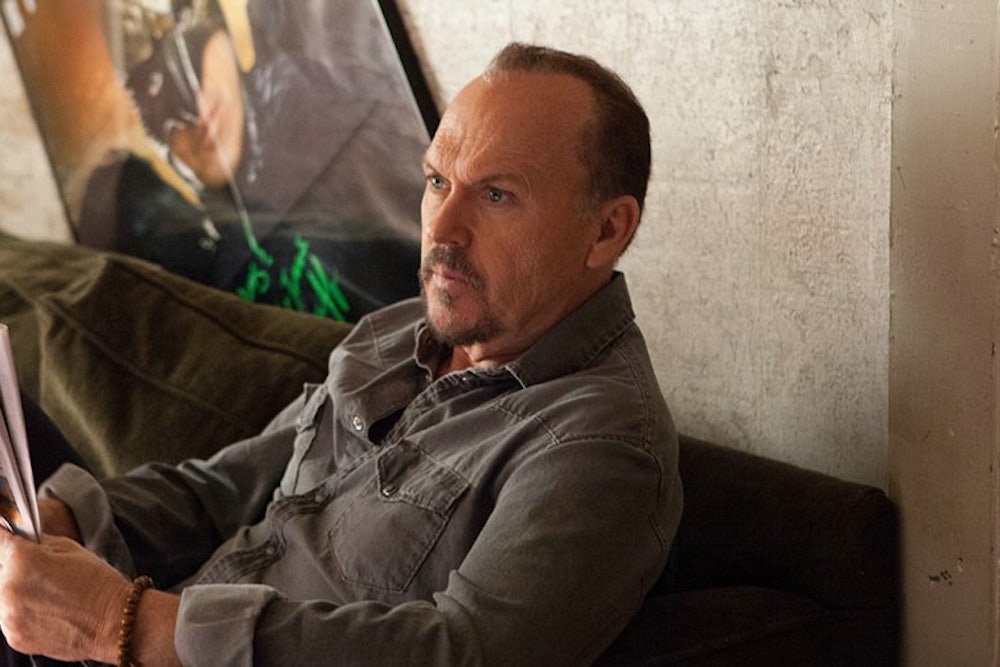With Birdman taking the top prize at the Academy Awards on Sunday, it's time to reconsider a deeply engrained cultural benchmark: the “Oscar movie.” What exactly is an Oscar movie, anyway? The past few years of Best Picture winners suggest a pattern of rewarding films that directly engage with Hollywood, the business of entertainment and the very act of movie-making. Birdman is the third Best Picture in four years to fit this sub-genre of behind-the-screen drama—following The Artist at the 2012 ceremony and Argo in 2013. Alejandro Iñárritu's film seems to have caught the industry's zeitgeist. Hollywood is running scared, so the Oscars have turned inward for self-validation.
Step back a moment and marvel that such a formally brash, flashy stunt piece just won the Oscar. Birdman, in fact, contrasts starkly with the old Oscar movie template of sweeping historical epics and safe, stately dramas that set weepy actors in handsome wide shots and enlist orchestras to drag a horsehair bow across our heartstrings. It's a template that became entrenched during the '90s run of Best Picture winners: Dances with Wolves, Braveheart, The English Patient and Titanic all claimed the top honor among a shared total of 32 Oscars. We still crank out films in that mold—Unbroken, War Horse, and Lincoln, to name a few—but lately the Academy has passed on those options for the big prize. Birdman looks nothing like these films. Nor, for that matter, did The Artist, the silent, black-and-white picture; or Argo, a rollicking suspense-drama hybrid closer to The Great Escape than Forrest Gump. This spate of Best Picture winners shares a thematic similarity more than a stylistic one.
During the Oscars' 87-year history, Best Pictures that focus on showbiz have been rare. Before The Artist, you'd have to go back to All About Eve (1950) triumphing with a story explicitly about actors, and Cecil B. DeMille's The Greatest Show on Earth (1952), about trapeze artists competing for the center ring, following close behind.
That timing isn't coincidental. In the early 1950s, Hollywood was in the first stages of a crisis: An upstart medium called television was erupting into wide popularity. Massive radio stars George Burns and Gracie Allen put their act in front of CBS's cameras in 1950, creating one of the first successful sitcoms. CBS made its first color broadcast tests in 1951. Movie producers worried that the convenience of TV shows and movies broadcasted right to the home would discourage audiences from going to theaters, so they reoriented their business around spectacles ever-bigger tentpole projects. Gimmicks like 3-D and Smell-O-Vision were being developed, along with a range of widescreen formats. Amid the industry turmoil and uncertainty, the Academy turned to films about aging performers fighting to stay relevant against younger competition: Billy Wilder's not-dissimilar Sunset Boulevard was nominated the same year as All About Eve.
Today, Hollywood is fending off more challengers. The rapidly rising production values on television and online have made professional, high-quality moving images more democratic. Just look: An HBO show is playing in IMAX theaters, and an exclusively online production company can crowd-fund more than $2 million to make a feature. As television once did, new media are intruding into Hollywood's cultural monolith, making the playing field more level than it was even 10 years ago. Warner Bros., Fox, MGM and Paramount are no longer cinematic oligarchs—they're just rich graybeards among an expanding peer group.
That doesn't necessarily spell doom for the traditional movie studios. The massive success of American Sniper, for one, show they're still capable of capturing the public's attention (and its money). But in the new model of distribution, giant studios—and their myriad actors, directors, writers, designers, technicians and publicists—will need to adjust their expectations. And course-correction has never been Hollywood's strong suit.
Birdman resonated with Academy voters because depicted creators in crisis—an expression of the fear and paranoia that many in the industry must now feel when sizing up their own careers. Its protagonist, Riggan Thomson, Michael Keaton's washed-up action star, may or may not truly be an unsung talent; Birdman never makes that explicit. But the film sympathizes with his desire for fulfillment, and with his uncertainty that lowbrow comic-book blockbusters or highbrow prestige fare will satisfy him.
That same anxiety pervades Hollywood right now. Like the rest of us (to paraphrase Emma Stone's Birdman character), movie stars just want to be told that they matter, even if they have to rely on themselves for that assurance.
For more Oscar coverage, click here.
